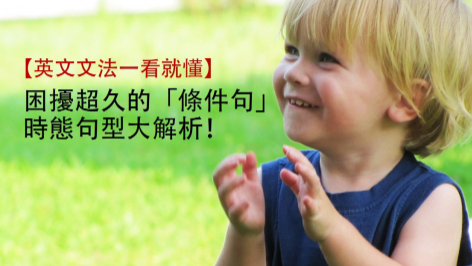基本句
先从最基本的句型开始!这种句型用来表达不可能改变的事实:如果前面的「A」发生,后面的「B」也一定会发生。
典型的句子:
If the sun rises, the night is over.
如果太阳出来,夜晚就结束了。
*句子的两段都是用现在简单式。
我们来拆解它的架构:
[A事件]
If + subject + simple present
如果 + 主语 + 现在简单式
[B事件]
Subject + simple present
主语 + 现在简单式
(Example)
If + the sun + rises, the night + is over
If the sun rises, the night is over.
如果太阳出来,夜晚就结束了。
第一类条件句 (Type 1 conditional sentences)
第一种条件句就可以加入一点想像的元素! 「A」是「B」的起源,两者有密切的连带关系,但如果前面的「A」发生,后面的「B」也许会发生、也许不会发生。

典型的句子:
If you go out without a coat, you will catch a cold.
如果你不穿外套出门,你会着凉。
*句子的前段是用现在简单式,后段是用未来简单式。
我们来拆解它的架构:
[A事件]
If + subject + simple present
如果 + 主语 + 现在简单式
[B事件]
Subject + simple future
主语 +未来简单式
(Example)
If + you + go out without a coat, you + will catch a cold
If you go outside without a coat, you will catch a cold.
如果你不穿外套出门,你会着凉。
*也许你已经穿了保暖的衣服,或者永远都不怕冷。
第二类条件句 (Type 2 conditional sentences)
超越了「一」以后,第二种条件句的想像的成分又更多了!句子中,一开始的「A」就是假设或者不真实的,而如果假设的「A」成立,后面的「B」也许会发生,或者不会发生。由于假设的「A」可能根本不会发生,所以「B」实现的可能性就更低了!
典型的句子:
If she had unlimited wealth, she would be the happiest person in the world.
如果她拥有无限的财富,她就会是世界上最快乐的人。
*句子的前段是用过去简单过去式,后段是用现在条件式。
我们来拆解它的架构:
[A事件]
If + subject + simple past
如果 + 主语 +过去简单式
[B事件]
Subject + present conditional (would)
主语 +现在条件式(就会)
(Example)
If + she + had unlimited wealth, she + would be the happiest person in the world.
If she had unlimited wealth, she would be the happiest person in the world.
如果她拥有无限的财富,她就会是世界上最快乐的人。
*她不太可能有无限的财富,也因此不会变成世界上最快乐的人。
第三类条件句 (Type 3 conditional sentences)
第三种条件句与「二」相同的地方是同样是「从假设或者不真实的出发点开始」,可是它不止扩张了想像空间,也改变了描述的时间:第三种条件句中的假设的「A」在过去没有发生,后面的「B」也就不可能成真。因为「A」与「B」都是没有希望成真的情景,当第三种条件句出现时,目的都是用来表达后悔的心情,或者「早知如此,何必当初」的感想。
典型的句子:
If I had known the exam was extremely difficult, I would have studied harder.
如果我早知道考试这么难,我当初就会更努力读书。
*句子的前段是用过去完成式,后段是用现在条件完成式
我们来拆解它的架构:
[A事件]
If + subject + past perfect
如果 + 主语 + 过去完成式
[B事件]
Subject + perfect conditional (would have) + past participle
主语 + 完成条件式 (当初就会) + 过去分词
(Example)
If + I + had known + the exam was extremely difficult, I + would have + studied + harder
If I had known the exam was extremely difficult, I would have studied harder.
如果我早知道考试这么难,我当初就会更加努力读书。
既然第三种条件句是虚拟的情景开场,主要的子句也可以运用 “could have”,“should have”,“might have” 来代替通常会出现的 “would have”。参考以下的比较与分析:
1. could have = 当初就能
If I had known the exam was extremely difficult, I could have studied harder.
如果我早知道考试这么难,我当初就可以更加努力读书。
(没有用功读书的学生后悔自己没有善用时间与自己的潜力。)
2. should have = 当初就应该
If I had known the exam was extremely difficult, I should have studied harder.
如果我早知道考试这么难,我当初就应该更加努力读书。
(没有用功读书的学生后悔没有提醒自己做应该做的事。)
3. might have = 当初可能会
If I had known the exam was extremely difficult, I might have studied harder.
如果我早知道考试是非常的困难,我当初可能会更加努力读书。
(没有用功读书的学生用半吊子的态度反省不读书的行为 。)
条件句例句
可惜天公不作美
If it hadn’t rained, the field trip would have been a success.
如果当初没有下雨,校外教学就会很成功。
If the sun had come out, the ones who went hiking could have seen a beautiful view.
如果当初太阳有出现,去爬山的人就能看到美丽的风景。
If everyone had put on more clothes during the field trip, most of the students might not have caught the flu.
如果大家在校外教学的时候穿的暖一点,大部分的学生可能就不会得流感了。
后悔没有伸出援手
If I had known my coworker was ill, I would have called him.
如果我早知道我的同事病了,我就会打电话给他。
If I had known my coworker was having personal problems, I could have helped him.
如果我早知道我的同事是有一些私人问题,我就可以帮助他。
If we had offered our coworker a helping hand, and a shoulder to lean on at his time of need, his health might have gotten better.
如果我们提供我们的同事伸出援助之手,一个可以依靠的肩膀,在他需要的时候,他的健康状况可能就会变得更好。
不能回头改变的重大决定
If she hadn’t got married at eighteen, she would have gone to college.
如果她没有在十八岁的时候结婚,她就会去读大学。
She should have let her husband know her anxiety and fear of getting married at such a young age.
她当时应该要让她的先生知道,她对于太早结婚的害怕与恐惧。
If she had known that people often change how they feel about their first loves as they grow older, she might not have been afraid to be alone.
如果她早知道随着年龄的增长,人们经常改变对于自己的初恋的感觉,她当时可能就不会如此害怕孤独。







